Hebrews 13:2 Be not forgetful to entertain strangers: for by this some have entertained angels unawares.
For the first ten years we live in the Protestant timezone of Malate on 1667 B Wright Street. Our small two blocks hosts Ellinwood Malate Church the UCCP American gothic cathedral right across from our green gates. Our neighbors are Ellinwood Bible School, and the Interboard Guest House where missionaries stay when they come into Manila. Philippine Christian College up on Taft Avenue, but PCC high school is right at the end of the block and soon the elementary school will abut our yard. Union Theological Seminary has not yet moved to Cavite.
In the first years, Malate streets were named after American Divisions that occupied Manila during Philippine-American war from 1989-1913– Tennessee, Indiana, Nebraska near Remedios circle, Carolina, Kansas, California, Dakota, Vermont streets. The street names were later changed to Filipino military heroes of the Philippine-American war to get back at Divisions who had landed there, I guess.
Wright Street runs like a tributary into Herran, a busy one-way street that unloads its jeepneys into the bustling Taft Avenue three blocks away. Taft is named for the American Governor General. The wide gracious boulevard lined with acacias is like the Pasig river of jeepneys, schools of noisy fish swimming in both directions. You lift your hand for a colorful ‘catch’ that marks its destination in bright metal signs stuck in the windshield: Quiapo, Divisoria, Tulay, Espana, over the Pasig River.
Cadena de amor drape the wire fence that hides our missionary compound from the street, their tiny pink flowers peeking through the green vines. Come through our large green gate down the gravel drive. On the right is a row of three two-story houses painted white with green roofs and big screen windows laced with black iron bars. Filipino who see these monstrosities know that each house could hold two families instead of our modest family of five.
It’s not that no one enters. God sends through the green gates angels unawares; we just have to pick out the angel. Late morning or early afternoon, there is always the scissor knife man on his bicycle. Then Doktora Ilano’s egg jeepney arrives. She also owns the famous Country Bakeshop on Isaac Peral Ave ( we pronounce it Y-sac Pe-ral). The blind man is led by his son through the gates, and many others slip through the gates to ask for help at my father’s office screen door.
My bet is on the scissor-knife man. He’s skinny with a thin friendly face. He bicycles around in the morning to sharpen knives. When the shoeshine man is spiffing dad’s shoes at the bottom of the stairs, they nod. The scissor knife man hoists his bicycle on its breaks on the gravel driveway under our acacia tree. Sometimes Elena lets us carry our knives to him. On the back of his bicycle he whirls the knives over the whet stone, holding the blades like a baby as sparks spit out. He is everywhere. Mom sees him all over town and he always waves.
Mom says that when we transferred to another house in our compound, and the movers had disappeared, the scissor-knife man was there, like the Holy Spirit. ”Excuse me,” she says, embarrassed. He looks up quizzically from his whet stone. “Could you help with some furniture?” He smiles and stores his equipment. They move back and forth until the delinquent movers return.
“No, No, mum” he waves off my mother’s grateful pesos as they stand in our new sala.
“Cud you gib me a Tagalog Bible, mum?”
My American missionary mom, better at discerning spirits, is not quick with accents.
He touches the window sill, “Gud is nut in heben, mum, Gud is hir.”
Mom squints with effort, ”Yes, God is everywhere and with us.”
Alarmed, the scissor-knife man pats the window sill again to make his point, “Gud is nut in da wud, mum.”
“No, no,” says mother, suddenly illuminated, “He is with us and in us.” They smile in concord, but the scissor-knife man’s face shines in a special way.
“I will find you a Tagalog Bible,” my mother promises.
For the first ten years we live in the Protestant timezone of Malate on 1667 B Wright Street. Our small two blocks hosts Ellinwood Malate Church the UCCP American gothic cathedral right across from our green gates. Our neighbors are Ellinwood Bible School, and the Interboard Guest House where missionaries stay when they come into Manila. Philippine Christian College up on Taft Avenue, but PCC high school is right at the end of the block and soon the elementary school will abut our yard. Union Theological Seminary has not yet moved to Cavite.
In the first years, Malate streets were named after American Divisions that occupied Manila during Philippine-American war from 1989-1913– Tennessee, Indiana, Nebraska near Remedios circle, Carolina, Kansas, California, Dakota, Vermont streets. The street names were later changed to Filipino military heroes of the Philippine-American war to get back at Divisions who had landed there, I guess.
Wright Street runs like a tributary into Herran, a busy one-way street that unloads its jeepneys into the bustling Taft Avenue three blocks away. Taft is named for the American Governor General. The wide gracious boulevard lined with acacias is like the Pasig river of jeepneys, schools of noisy fish swimming in both directions. You lift your hand for a colorful ‘catch’ that marks its destination in bright metal signs stuck in the windshield: Quiapo, Divisoria, Tulay, Espana, over the Pasig River.
Cadena de amor drape the wire fence that hides our missionary compound from the street, their tiny pink flowers peeking through the green vines. Come through our large green gate down the gravel drive. On the right is a row of three two-story houses painted white with green roofs and big screen windows laced with black iron bars. Filipino who see these monstrosities know that each house could hold two families instead of our modest family of five.
It’s not that no one enters. God sends through the green gates angels unawares; we just have to pick out the angel. Late morning or early afternoon, there is always the scissor knife man on his bicycle. Then Doktora Ilano’s egg jeepney arrives. She also owns the famous Country Bakeshop on Isaac Peral Ave ( we pronounce it Y-sac Pe-ral). The blind man is led by his son through the gates, and many others slip through the gates to ask for help at my father’s office screen door.
My bet is on the scissor-knife man. He’s skinny with a thin friendly face. He bicycles around in the morning to sharpen knives. When the shoeshine man is spiffing dad’s shoes at the bottom of the stairs, they nod. The scissor knife man hoists his bicycle on its breaks on the gravel driveway under our acacia tree. Sometimes Elena lets us carry our knives to him. On the back of his bicycle he whirls the knives over the whet stone, holding the blades like a baby as sparks spit out. He is everywhere. Mom sees him all over town and he always waves.
Mom says that when we transferred to another house in our compound, and the movers had disappeared, the scissor-knife man was there, like the Holy Spirit. ”Excuse me,” she says, embarrassed. He looks up quizzically from his whet stone. “Could you help with some furniture?” He smiles and stores his equipment. They move back and forth until the delinquent movers return.
“No, No, mum” he waves off my mother’s grateful pesos as they stand in our new sala.
“Cud you gib me a Tagalog Bible, mum?”
My American missionary mom, better at discerning spirits, is not quick with accents.
He touches the window sill, “Gud is nut in heben, mum, Gud is hir.”
Mom squints with effort, ”Yes, God is everywhere and with us.”
Alarmed, the scissor-knife man pats the window sill again to make his point, “Gud is nut in da wud, mum.”
“No, no,” says mother, suddenly illuminated, “He is with us and in us.” They smile in concord, but the scissor-knife man’s face shines in a special way.
“I will find you a Tagalog Bible,” my mother promises.
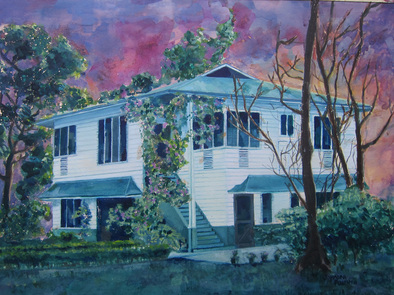
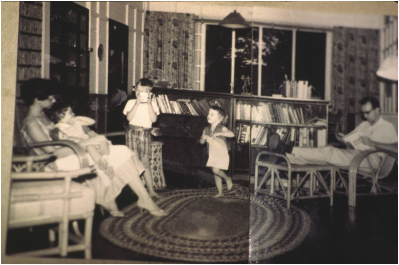
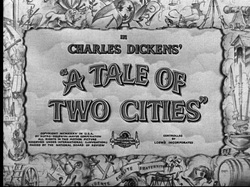
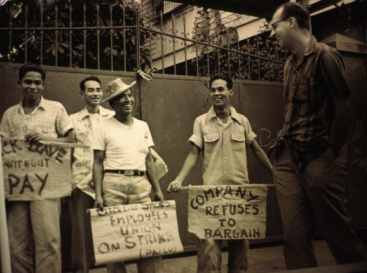
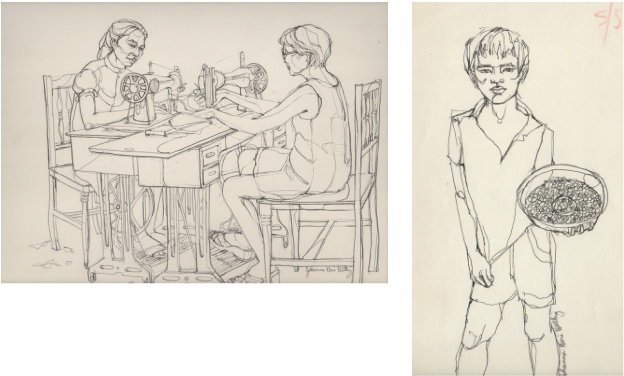
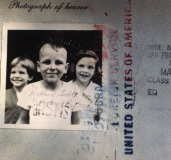
 RSS Feed
RSS Feed
